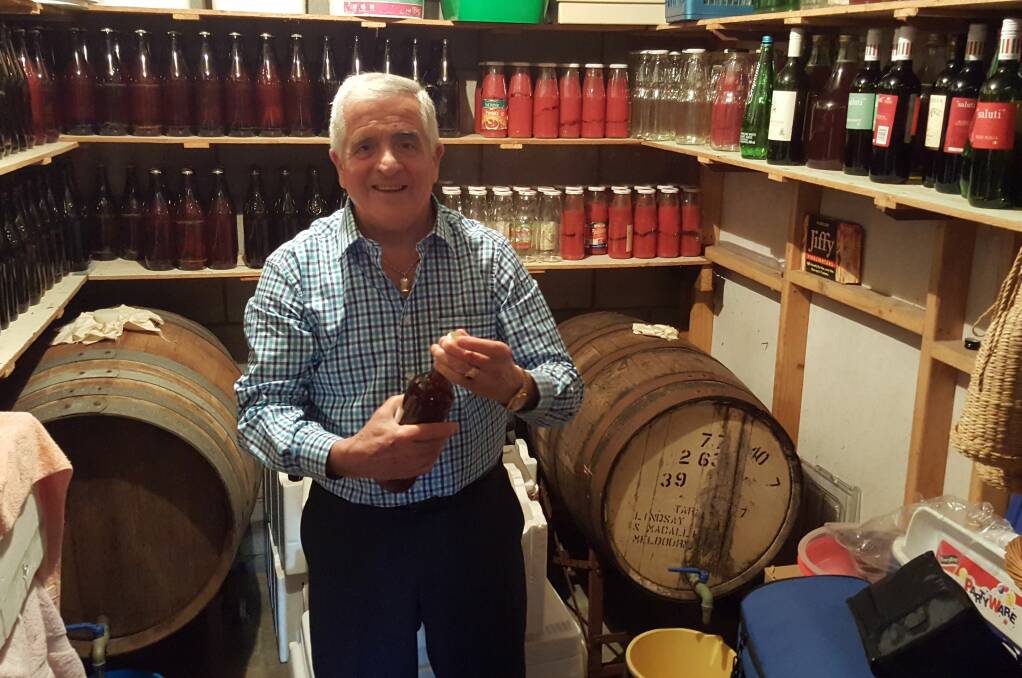
GAETANO Remine had been dreaming of living in the country of Fred Astaire and Gene Kelly since he was a little boy.
Subscribe now for unlimited access.
or signup to continue reading
The Italian-born tailor from the ‘City of Olives’ had always believed America was where he belonged.
That was until Warrnambool icon Fletcher Jones created a new dream for the boy from Bitonto.
Having avoided compulsory army service in 1960, the 20-year-old had his hopes destroyed when US immigration closed its doors.
The charming character from southern Italy, now in his 70s, said the rejection became his first step on a 17,000-kilometre journey across the globe.
“American immigration at the time was closed,” he said. “But there was a call-up for Australia and I always wanted to live in an English-speaking country.”
With few options and limited education, young Gae knew he would have to leave his hometown to succeed.
“There was no factories, no industry,” he said of post-war Italy. “We were the farmers of the country, we sent olives, grapes and wheat north to keep them working.”
Having left school at grade 5, the first-born son of a tailor said he was expected to follow his father’s career and support his parents financially.
“We were poor,” he said. “That was the time.
“My father was a very good tailo. But the only people who could afford suits were doctors, accountants, and school teachers and there are not too many in a little town.
“This was something I learned later from Fletcher Jones – quality and production must balance or you don’t make money.”
Australia was then offering to take Italian migrants for 110 pounds.
“I knew if I worked hard I could send pounds home to mamma,” Gae said.
It took two months to complete paperwork and medical testing and on March 14, 1961, Gae boarded the Aurelia in Genova, bound for the lucky country.
The 22-day journey became a lesson in itself with Gae taking on-board English classes every afternoon.
By May the young Italian had arrived at his first accommodation in Bonnegilla.
“It was an old army barracks near Wodonga they had made into a migrant camp,” he said.
Here Gae shared a six-bunk room with a dozen other Italian expatriats.
“It was such a disgusting thing,” he said. “We had come from a country where mamma used to do everything. I came here to Australia and I never knew how to boil an egg.”
It took a month of job-hunting before Gae was employed on the Seamore railways.
The fashion-focused tailor can still recall his outfit after 56 years.
“I went to work with light grey flannel trousers on,” he said. “In 1961 it was the top material.”
“Picking and shoveling. A tailor, with delicate hands, and my trousers were light grey flannel.”
His evenings became filled with clothing alterations for a local tailor.
The cheeky Italian claims his work was so good the tailor became jealous and wrote him a reference so he’d “go away”.
The reference became a job offer from Fletcher Jones, who had invited the talented clothing maker to work at his Warrnambool factory – a factory by the sea.
“As soon as he said the sea I said ‘yes that’s where I’m going’ because I love the sea,” Gae said.
A train from Melbourne to Warrnambool was the final journey for the Italian and his suitcase of stylish clothing.
The astute tailor worked for the man he called a ‘god’ until he retired 26 years later.
His beloved workplace is also where he made friends and met his wife Heather.
“At the time there were no supermarkets in Warrnambool,” he said. “Some Sicilian staff would go to buy our salami in Geelong. Our pasta, our cheeses, our olive oil .. because that was our custom.”
Custom and traditions were valued highly by Gae, who continued to teach his three children of his Italian heritage.
“Keep your traditions, that’s important,” he said. “But it’s up to the individual, you’ve got to mingle. You’ve also got to learn the language, learn the lingo, otherwise you don’t get anywhere.”
Gae said despite the odd insult, integrating into his new home was easy.
“When we used to go dancing at the Palais they used to look down at us,” he said.
“Because we were the wogs, the dagos. But as time goes by I change, you change, and the world goes around.”
The migration of cultures and the global attitudes of younger generations has changed Warrnambool, according to Gae.
“The new generation, they’re different Australians,” he said.
“In 1961 I had to deal with old Australians – Australians who’d never been overseas.
“Some had never even been to Melbourne from Warrnambool.
“This is a multi-cultural society now.
“Warrnambool people need to be tolerant.
“Give the migrants time to integrate. It takes time.”















